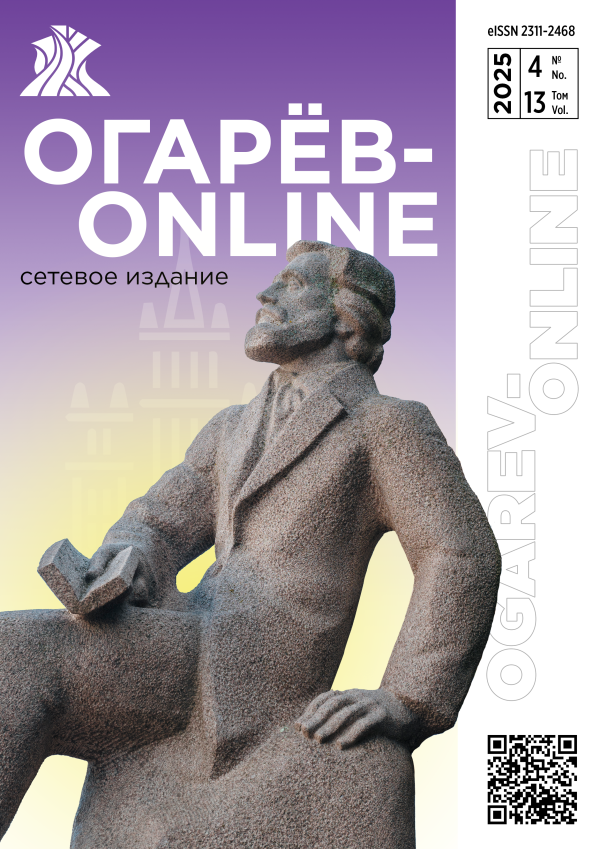Vol 10, No 13 (2022)
- Year: 2022
- Published: 30.10.2022
- Articles: 10
- URL: https://ogarev-online.ru/2311-2468/issue/view/17705
Full Issue
Development and simulation of forward current test pulse generator for studying power diodes
Abstract
The article presents the results of the simulation of a circuit design solution for a direct current pulse generator for testing semiconductor devices and a program for generating a control voltage of a half-sine waveform of a test pulse in the form of a 12-bit binary code in the VHDL language. The operation algorithm of the generator of half-sinusoidal current pulses is described.
 2-8
2-8


Simulation of stabilized power supply for cascades of amplification in measuring devices
Abstract
This article presents the results of modeling in the Multisim 11.0 software environment of the dependences of the electrical parameters of the linear power supply implemented on the KR142EN8V chip on the resistance of the secondary winding of the transformer Ri in the range from 0.1 to 10 ohms when the capacity of the smoothing capacitor changes from 0.1 mF to 5 mF. The studies were carried out under the condition of a current flow in an active load equivalent to the power supply circuits of operational amplifiers with a value of up to 1.25 A. The conditions for the formation of output voltage ripples at a span level of no more than ± 1 mV were determined.
 9-15
9-15


Methodology for the study of deep centers for the delay of avalanche breakdown of p–n-junction: a study of strong field dependence of emission coefficients
Abstract
The article describes an improved technique for the study of deep centers in microplasma channels based on the statistical delay of the avalanche breakdown of the p–n- junction. It is proposed to change the shape of the voltage pulses applied to the p–n-junction in such a way as to exclude field recharge of deep centers in the region of a strong electric field.
 16-20
16-20


Implementation of а software-defined radio receiver based on programmable logic integral circuits
Abstract
The study deals with the selection of programmable integrated logic circuits for creating a software-defined radio system and its modeling. The simulation of the quadrature demodulator model on the FPGA was carried out and its operation was verified in the FPGA-in-the- loop mode.
 21-26
21-26


Updating database of repository of neural network models for analysis and prediction of spatial processes
Abstract
The article describes the solution for the problem of updating the database of the repository of neural network models for the analysis and forecasting of spatial processes based on the project-oriented approach. The process of integrating deep neural networks in the repository is based on the project-oriented approach, on the basis of which each stored deep neural network is compared with the range of tasks within which it can be used and with the data it analyzes. Within the framework of the repository, models are integrated that allow solving the problems of classification, segmentation and detection of objects based on remote space monitoring data.
 27-35
27-35


System engineering of integrated circuits design for interface RS-485 channel to control measuring equipment
Abstract
The article provides the results of the analysis of the RS-485 interface and the system engineering development of a transceiver circuit for the data exchange controlling in measuring equipment. Using system engineering analysis, the authors offer a circuit design solution for the development of a transceiver chip based on a bipolar VID process technology.
 36-43
36-43


Simulation modeling of active power factor corrector
Abstract
The article describes a circuit design solution for an active power factor corrector used in pulse converters with a power up to 450 W. Calculation of operating modes of the power factor corrector circuit is presented. The main advantages of this design and circuit simulation results of active power factor corrector are provided.
 44-50
44-50


Curcuit engineering design and simulation of potential protection block of the output buffer of power mosfet control IC
Abstract
The article describes the results of the developing and simulation of the potentialprotection of the output buffer circuits in the control integrated circuits of a power MOSFET. The circuit design solution is proposed for the development of an IC driver based on a bipolar VID process technology.
 51-57
51-57


Building a MODBUS/DALI interface converter to control the light using programmable logic controllers
Abstract
The issues of constructing a MODBUS/DALI interface converter that allows light control using programmable logic controllers are considered. Structural and circuit design solutions are proposed using the Arduino Uno hardware platform as a programmable converter core.
 58-61
58-61


 62-68
62-68

















